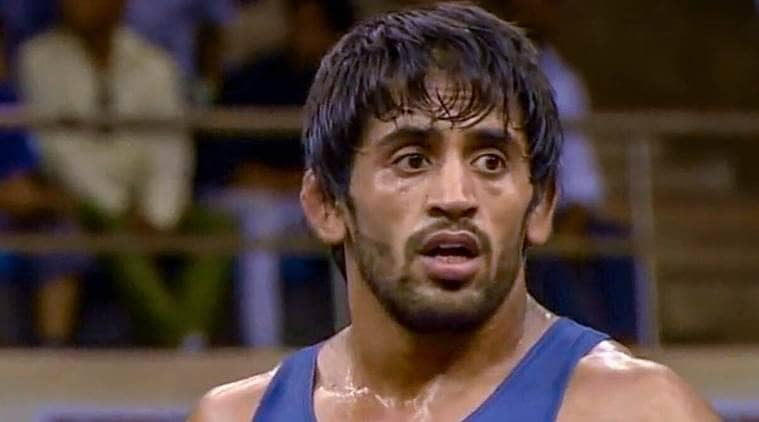 Bajrang Punia, of late, has been glued to his mobile phone. (Source: PTI)
Bajrang Punia, of late, has been glued to his mobile phone. (Source: PTI)
Bajrang Punia, of late, has been glued to his mobile phone. Staring at the screen for hours, he has even missed training sessions. However, India’s big gold medal hope in the 65 kg category, isn’t too bothered by it. He’s convinced that the time spent away from the mat of late has made him a wiser wrestler.
For, a majority of the time he devotes to his phone has been to scout and keep himself updated with global wrestling trends and more importantly the progress of his international rivals. It’s perhaps come about late in the day, but the 24-year-old has finally realized the importance of staying on top of his game, especially away from the mat.
“It’s like a new-found love. I never cared about all this until last year,” Bajrang says as his fingers dance on the keyboard to trace the live streaming of the Russian Nationals in Moscow.
It was the humiliating first round loss at the 2017 World Championships in Paris that changed Bajrang’s approach. It’s then that the ugly truth of his own ‘frog in the well’ existence hit home strongly.
“I felt ashamed. Wrestlers from other countries were coming and telling me that I should have wrestled this way and that way. I was shocked. It was my job to find out not theirs. I felt bad that day,” he says.
Despite medals at World Championships, Asiad and Commonwealth Games; Bajrang realized that he’d had an amateurish approach towards wrestling till then. He wasn’t investing sufficient time to enhance his strengths, or even dissecting his rivals’ weakness. This rather regimental approach to wrestling had made things mechanical.
“I was not enjoying wrestling. I used to go and wrestle and come back. Win or loss didn’t matter. I never checked my mistakes. In a way, I was betraying my sport. I learnt in the last 10 months that wrestling is more than just going out there and fighting with another guy on the mat,” he says.
For a major part of his career, Bajrang was under Yogeshwar Dutt’s towering shadow. He had to wrestle at 61kg, a non-Olympic weight category, because Dutt was wrestling at 65kg. Dutt to his credit has mentored his junior colleague since he joined Chhatarsaal stadium as a kid. And it had become a worrying practice that the senior wrestler would do most of the thinking on Bajrang’s behalf.
It’s only when Dutt faded away, that Bajrang has come into his own. He is winning, and also rediscovering himself. In the last 10 months, Bajrang has won a U23 Worlds’ silver, gold medals at Commonwealth Games, Tbilisi Grand Prix and Yasar Dogu. He is also currently the No.2 wrestler in the world at 65kg. All this because he started to “enjoy and learn wrestling again.”
Another reason for the new and improved Bajrang has been his new coach, who he had first met as an absolute stranger.
“At the U23 World Championship, I lost the final to Russia. After the bout, a stranger came up to me and tells me my mistakes and how I could have won. I did not even know this guy,” Bajrang says.
That person was Shako Bentinidis, who Bajrang hired as his personal coach in February this year. Shako was blunt in pointing out to Bajrang his mistakes and all the easy points he gave away in Poland. He did not know Bajrang but had seen him at previous competitions. During the Pro Wrestling League in January this year, Bajrang asked the Georgian wrestlers about Bentinidis and subsequently brought him on board. It proved to be a “good” decision for the Indian wrestler.
“Pehle darr tha. When you hear things like the world champ or the Olympic champ is coming, I would think it’s already over. You are not at your natural self while wrestling them. But in the last eight months, that perception has changed. I have changed and so has my thinking towards wresting. All thanks to Shako,” he says.
Bentinidis, Greek by origin, wrestled for Georgia and was a European champion. Since he joined Bajrang’s team, the Indian has lost only a single bout. But the biggest test so far for both of them will be the Asian Games.
“My focus is on Bajrang. The Asian Games is a big deal and I know it. You see how he has improved in the last few months.He is talented and I am working hard on improving him. At the Asian Games, he will have to wrestle at his best. He gives up his legs too often and that is a big problem. We’re working on his leg defence. He knows that too,” Shako says.
And for once, Bajrang will be ready too, having done his own legwork, even if only while staring incessantly at his phone screen.